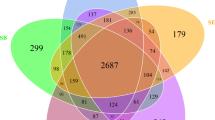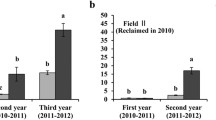Abstract
Seaweed and its extracts have been developed as fertilizers because they possess plant-growth-promoting and antibacterial compounds. For use as fertilizers, the major carbohydrates in seaweed, including fucoidan and alginate, need to be efficiently digested in the soil. We isolated fucoidan/alginate degrading bacteria from paddy soil and verified its use as a biofertilizer. Results show that Stenotrophomonas pavanii has a high alginate degrading activity, and also stimulating melon, pepper, and tomato growth. The growth stimulation effect of the bacteria was enhanced by alginate treatment. Bacillus sp. was isolated as a fucoidan degrading bacterium and this bacterium was also able to stimulate melon growth. Using 16S ribosomal DNA analysis, fucoidan/alginate resistant or susceptible bacteria were successively selected. Bacteria with increased population due to fucoidan and alginate had specificity to each carbohydrate, whereas those with decreased population showed susceptibility to both carbohydrates. This report demonstrates some bacteria for their use as biofertilizers with seaweed and demonstrated that a high throughput method is efficient in identifying bacteria with specific properties.




Similar content being viewed by others
Availability of data and materials
All data generated or analyzed during this study are included in this published article.
References
Battacharyya D, Babgohari MZ, Rathor P, Prithiviraj B (2015) Seaweed extracts as biostimulants in horticulture. Sci Hortic-Amsterdam 196:39–48. https://doi.org/10.1016/j.scienta.2015.09.012
Benítez García I, Dueñas Ledezma AK, Martínez Montaño E, Salazar Leyva JA, Carrera E, Osuna Ruiz I (2020) Identification and quantification of plant growth regulators and antioxidant compounds in aqueous extracts of Padina durvillaei and Ulva lactuca. Agronomy. https://doi.org/10.3390/agronomy10060866
Chizhov AO et al (1999) A study of fucoidan from the brown seaweed chorda filum. Carbohyd Res 320:108–119. https://doi.org/10.1016/S0008-6215(99)00148-2
Cumashi A et al (2007) A comparative study of the anti-inflammatory, anticoagulant, antiangiogenic, and antiadhesive activities of nine different fucoidans from brown seaweeds. Glycobiology 17:541–552. https://doi.org/10.1093/glycob/cwm014
de Castro V et al (2020) Plant growth regulation by seed coating with films of alginate and auxin-intercalated layered double hydroxides. Beilstein J Nanotech 11:1082–1091. https://doi.org/10.3762/bjnano.11.93
Dobrincic A, Balbino S, Zoric Z, Pedisic S, Kovacevic DB, Garofulic IE, Dragovic-Uzelac V (2020) Advanced technologies for the extraction of marine brown algal polysaccharides. Mar Drugs 18:168. https://doi.org/10.3390/md18030168
Foley SA, Szegezdi E, Mulloy B, Samali A, Tuohy MG (2011) An unfractionated fucoidan from Ascophyllum nodosum: extraction, characterization, and apoptotic effects in vitro. J Nat Prod 74:1851–1861. https://doi.org/10.1021/np200124m
Ghaderiardakani F, Collas E, Damiano DK, Tagg K, Graham NS, Coates JC (2019) Effects of green seaweed extract on arabidopsis early development suggest roles for hormone signalling in plant responses to algal fertilisers. Sci Rep 9:1983. https://doi.org/10.1038/s41598-018-38093-2
Gurley HG, Zdor RE (2005) Differential rhizosphere establishment and cyanide production by alginate-formulated weed-deleterious rhizobacteria. Curr Microbiol 50:167–171. https://doi.org/10.1007/s00284-004-4422-4
Hentati F et al (2018) Structural characterization and antioxidant activity of water-soluble polysaccharides from the Tunisian brown seaweed Cystoseira compressa. Carbohydr Polym 198:589–600. https://doi.org/10.1016/j.carbpol.2018.06.098
Hernandez-Herrera R, Santacruz-Ruvalcaba F, Ruiz-Lopez MA, Norrie J, Hernandez-Carmona G (2014) Effect of liquid seaweed extracts on growth of tomato seedlings (Solanum lycopersicum L.). J Appl Phycol 26:619–628. https://doi.org/10.1007/s10811-013-0078-4
Hu RF, Lin L, Liu TJ, Ouyang P, He BH, Liu SJ (2008) Reducing sugar content in hemicellulose hydrolysate by DNS method: A revisit J Biobased Mater Bio 2:156–161. https://doi.org/10.1166/jbmb.2008.306
Kalia A, Rattan A, Chopra P (1999) A method for extraction of high-quality and high-quantity genomic DNA generally applicable to pathogenic bacteria Anal Biochem 275:1–5. https://doi.org/10.1006/abio.1999.4259
Khan W, Rayirath UP, Subramanian S, Jithesh MN, Rayorath P, Hodges DM, Critchley AT, Craigie JS, Norrie J, Prithiviraj B (2009) Seaweed Extracts as Biostimulants of Plant Growth and Development J Plant Growth Regul 28:386–399. https://doi.org/10.1007/s00344-009-9103-x
Kusaykin M et al (2008) Structure, biological activity, and enzymatic transformation of fucoidans from the brown seaweeds. Biotechnol J 3:904–915. https://doi.org/10.1002/biot.200700054
Lee KY, Mooney DJ (2012) Alginate: properties and biomedical applications. Prog Polym Sci 37:106–126. https://doi.org/10.1016/j.progpolymsci.2011.06.003
Li X, Chen L, Forde BG, Davies WJ (2017) The biphasic root growth response to abscisic acid in arabidopsis involves interaction with ethylene and auxin signalling pathways front. Plant Sci 8:1493. https://doi.org/10.3389/fpls.2017.01493
Li B, Lu F, Wei X, Zhao R (2008) Fucoidan: structure and bioactivity. Molecules 13:1671–1695. https://doi.org/10.3390/molecules13081671
Mercier L, Lafitte C, Borderies G, Briand X, Esquerre-Tugaye MT, Fournier J (2001) The algal polysaccharide carrageenans can act as an elicitor of plant defence. New Phytol 149:43–51. https://doi.org/10.1046/j.1469-8137.2001.00011.x
Mutale-Joan C et al (2020) Screening of microalgae liquid extracts for their biostimulant properties on plant growth, nutrient uptake and metabolite profile of Solanum lycopersicum. L Sci Rep 10:2820. https://doi.org/10.1038/s41598-020-59840-4
Romanenko LA, Tanaka N, Svetashev VI, Mikhailov VV (2015) Pseudomonas glareae sp nov., a marine sediment-derived bacterium with antagonistic activity. Arch Microbiol 197:693–699. https://doi.org/10.1007/s00203-015-1103-6
Ruocco N, Costantini S, Guariniello S, Costantini M (2016) Polysaccharides from the marine environment with pharmacological. Cosmeceutical Nutraceutical Potential Mol 21:551. https://doi.org/10.3390/molecules21050551
Shukla PS, Mantin EG, Adil M, Bajpai S, Critchley AT, Prithiviraj B (2019) Ascophyllum nodosum-based biostimulants: sustainable applications in agriculture for the stimulation of plant growth. Stress Toler Dis Manag Front Plant Sci 10:655. https://doi.org/10.3389/fpls.2019.00655
Skriptsova AV (2015) Fucoidans of brown algae: Biosynthesis, localization, and physiological role in thallus. Russ J Mar Biol 41:145–156. https://doi.org/10.1134/S1063074015030098
Vasantharaja R, Abraham LS, Inbakandan D, Thirugnanasambandam R, Senthilvelan T, Jabeen SKA, Prakash P (2019) Influence of seaweed extracts on growth, phytochemical contents and antioxidant capacity of cowpea (Vigna unguiculata L. Walp). Biocat Agric Biotechnol 17:589–594. https://doi.org/10.1016/j.bcab.2019.01.021
Walker TS, Bais HP, Deziel E, Schweizer HP, Rahme LG, Fall R, Vivanco JM (2004) Pseudomonas aeruginosa-plant root interactions. Pathog Biofilm Form Root Exudation Plant Physiol 134:320–331. https://doi.org/10.1104/pp.103.027888
Wang Y, Xing M, Cao Q, Ji A, Liang H, Song S (2019) Biological activities of fucoidan and the factors mediating its therapeutic effects: a review of recent studies. Mar Drugs 17:183. https://doi.org/10.3390/md17030183
Xu SY, Huang X, Cheong KL (2017) Recent advances in marine algae polysaccharides: isolation. Struct Act Mar Drugs 15:388. https://doi.org/10.3390/md15120388
Zayed A, El-Aasr M, Ibrahim AS, Ulber R (2020) Fucoidan characterization: determination of purity and physicochemical and chemical properties. Mar Drugs 18:571. https://doi.org/10.3390/md18110571
Zhang C, Wang W, Zhao X, Wang H, Yin H (2020) Preparation of alginate oligosaccharides and their biological activities in plants: a review. Carbohydr Res 494:108056. https://doi.org/10.1016/j.carres.2020.108056
Zhao C et al (2018a) Bioactive compounds from marine macroalgae and their hypoglycemic benefits. Trends Food Sci Tech 72:1–12. https://doi.org/10.1016/j.tifs.2017.12.001
Zhao Y et al (2018b) Fucoidan extracted from undaria pinnatifida: source for nutraceuticals/functional foods. Mar Drugs 16:321. https://doi.org/10.3390/md16090321
Zou P et al (2021) Purification and characterization of a fucoidan from the brown algae Macrocystis pyrifera and the activity of enhancing salt-stress tolerance of wheat seedlings. Int J Biol Macromol 180:547–558. https://doi.org/10.1016/j.ijbiomac.2021.03.039
Acknowledgments
Not applicable.
Funding
This work was supported by the Cooperative Research Program for Agriculture Science and Technology Development (Project No. PJ01477601) funded by Rural Development Administration and Korea Institute of Planning and Evaluation for Technology in Food, Agriculture and Forestry (IPET) funded by the Ministry of Agriculture, Food and Rural Affairs (MAFRA) (Project No.321001–03).
Author information
Authors and Affiliations
Contributions
SY conducted the experiments and wrote the manuscript. JS conducted the experiments. YK designed the experiments and wrote the manuscript.
Corresponding author
Ethics declarations
Conflicts of interest
The authors declare no competing interests.
Additional information
Communicated by Erko Stackebrandt.
Publisher's Note
Springer Nature remains neutral with regard to jurisdictional claims in published maps and institutional affiliations.
Rights and permissions
About this article
Cite this article
Yang, S.H., Seo, J. & Koo, Y. Alginate and fucoidan changes the bacterial community in different directions and the alginate or fucoidan degrading bacteria isolated from paddy soil promotes the plant growth. Arch Microbiol 203, 5183–5192 (2021). https://doi.org/10.1007/s00203-021-02480-7
Received:
Revised:
Accepted:
Published:
Issue Date:
DOI: https://doi.org/10.1007/s00203-021-02480-7




